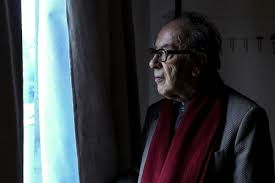Albanians mourned the loss of their “greatest cultural monument” on Monday following the death of acclaimed novelist Ismail Kadare. Kadare, who passed away from a heart attack at a Tirana hospital at the age of 88, was a literary giant often tipped for the Nobel Literature Prize.
Kadare, who passed away from a heart attack at a Tirana hospital at the age of 88, was a literary giant often tipped for the Nobel Literature Prize.
Prime Minister Edi Rama led the tributes, while Kosovo’s president Vjosa Osmani praised Kadare’s “remarkable contribution to Albanian and world literature.”
Kadare’s works, including “Broken April” and “The General of the Dead Army,” used metaphor and quiet sarcasm to depict the grim reality of life under the communist regime of Enver Hoxha.
His writing highlighted the struggles and resilience of the Albanian people during a time of intense political oppression.
Despite his defection to France in 1990, which led Albania’s communist leaders to brand him a traitor, Kadare faced accusations of having enjoyed a privileged position under Hoxha. He dismissed these claims with characteristic irony, famously remarking, “Against whom was Enver Hoxha protecting me? Against Enver Hoxha?”
Tributes Pour In
Prime Minister Rama, in a heartfelt Facebook post, thanked Kadare for the “extraordinary pleasure” his literary creations provided, describing him as a magician of words. Rama also addressed the jealousy Kadare’s success provoked among his critics, referring to them as “mediocres.”
Kosovo Prime Minister Albin Kurti called Kadare “the gleam of creativity, of humanity and of individual genius… in the darkness of dictatorship.” He praised Kadare’s ability to find ways to illuminate, question, and laugh even under severe political and artistic restrictions.
International Acclaim
Although Kadare never won the Nobel Prize, he was the recipient of the inaugural Man Booker International Prize in 2005, with judges likening his storytelling to that of Homer. British novelist Nicholas Shakespeare and former Prime Minister Tony Blair’s aide Alastair Campbell were among those who expressed that Kadare should have received the Nobel.
Albanian writer Lea Ypi, author of the memoir “Free,” honored Kadare as an “all-time magician of words” and recalled learning to recite his verses as a child. Kadare’s works have been translated into over 40 languages, significantly elevating Albanian literature on the global stage since the 1970s.
A Legacy of Resilience
Persida Asllani, head of literature at the University of Tirana, noted that Kadare reshaped both Albanian letters and society through his works published during and after the dictatorship. She emphasized that while Kadare may have passed, his literary legacy would continue to influence generations.
In one of his final interviews in October, Kadare reflected on how his writing helped him navigate and resist the repression of the communist regime. “The hell of communism, like every other hell, was smothering in the worst sense of the term,” he said. “But literature transformed that into a life force, a force which helped you survive and hold your head up and win out over dictatorship. Which is why I am so grateful for literature because it gives me the chance to overcome the impossible.”
Despite his frail health, Kadare remained dedicated to his craft until the end. His passing marks the end of an era for Albanian literature, but his works will continue to inspire and resonate with readers worldwide.
Source: AFP

